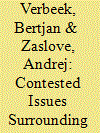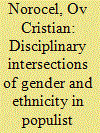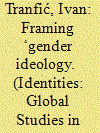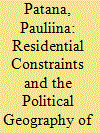| Srl | Item |
| 1 |
ID:
167232


|
|
|
|
|
| Summary/Abstract |
Populism seems to be a well-established notion in public and academic debate alike. Nevertheless, several issues surrounding populism are still contested and thus merit closer attention. These contested issues encompass the extent to which populism is novel and ubiquitous; the scope of the phenomenon; the merits of the various definitions of populism; its political colour(s); the potential danger it poses to democracy; its appropriateness to govern; as well as populism’s impact beyond national borders.
|
|
|
|
|
|
|
|
|
|
|
|
|
|
|
|
| 2 |
ID:
143653


|
|
|
|
|
| Summary/Abstract |
The present study examines how the desirable ideals of femininity for the ethno-nationalist project are framed in populist radical right media in contemporary Romania. The study examines the editorials of populist radical right party leader (Corneliu Vadim Tudor) published at election times between 2000 and 2012 in the weekly party publication. It explores the inventory of media frames, which provide the panopticon of femininity performances coming forth in Tudor’s editorials, and the disciplining endeavours these depictions enable. In the first step, the femininity performance of Romanian women seen as nationalist ideal of submission and childbearing is juxtaposed with the portrayal of women who forsake such expectations, and that of Roma women described as promiscuous and overly fertile. In the second step, the roles afforded to women in the public arena are evidenced, either as selfless heroines or their antithetic depiction, the power-hungry women.
|
|
|
|
|
|
|
|
|
|
|
|
|
|
|
|
| 3 |
ID:
185906


|
|
|
|
|
| Summary/Abstract |
This paper explores the role of the Catholic Church in the articulation of populist discourse. By analysing the frames in Catholic doctrines and their dissemination by the Croatian clergy, I make three contributions. Firstly, in contrast to research on the populist radical right, which demonstrates the manipulation of religion committed by secular actors, I identify the Church as an influential source and producer of the populist master frame. Secondly, I demonstrate how the bridging of the ‘gender ideology’ frame to this populist master frame allows the national Church to articulate traditionalist stances on morality policies. Thirdly, I identify the local-level argumentation strategies, empowered by frame bridging with anti-communist, nationalist, and sovereignist themes typical of radical-right populism. Focusing on religious actors’ agency allows us to improve theories rooted in the secular world of populist politics that neglect churches as important sources of populist discourse and mobilisation.
|
|
|
|
|
|
|
|
|
|
|
|
|
|
|
|
| 4 |
ID:
186663


|
|
|
|
|
| Summary/Abstract |
What explains variation in populist radical right (PRR) support within Western democracies? Specifically, why is contemporary PRR support often and increasingly stronger in areas seemingly detached from the effects of globalization, transnationalism, or immigration, the key issues these parties emphasize? This study articulates a theory of residential constraints to deepen understanding of these spatial patterns. I hypothesize that when citizens are residentially constrained—that is, when their means of reacting to local conditions and “voting with their feet” are limited—they are more likely to support PRR parties. To test this claim, I use a multimethod research design and exploit both quantitative and qualitative evidence from France, an important case of long-standing and geographically divided PRR support. I demonstrate that the PRR performs well in areas where locals’ access to services and opportunities is compromised and where opportunities and incentives to relocate are blocked by residential constraints. Residential constraints thus generate a set of relative economic grievances and render them highly salient in localities that may otherwise appear unaffected by more objective hardships and structural decay.
|
|
|
|
|
|
|
|
|
|
|
|
|
|
|
|